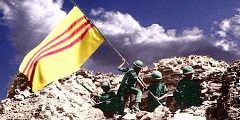FBI releases Russian spy trove
By Senior National Security Producer Suzanne Kelly, Oct. 31-2011
They called it "Operation Ghost Stories", and judging by the trove of detailed information posted online by the FBI, it was an espionage investigation that could have occurred at the height of the Cold War.
The FBI investigated, and then arrested, 10 Russian spies last year in a case that captured the nation's attention. Now, in response to a Freedom of Information Act (FOIA) request, the law enforcement agency is posting photographs, documents, and video clips of the suspects in secretly-taped meetings with undercover FBI agents.
The Russian Foreign Intelligence operatives (SVR) were suspected of trying to obtain classified documents (though the FBI says they never got any of them) and the FBI describes the operation as "well-funded" and "far-ranging".
One video details how Russian operative Christopher Metsos passed information to an official from the Russian Mission in New York in what's known in intelligence circles as a "brush pass."
The move is meant to like nothing more than a casual passing by to a person on the street (in this instance in a stairwell), but it is actually a method used to exchange information.
Another video shows Russian spy Anna Chapman, who has become a celebrity in Russia since being exposed, meeting in a New York coffee shop with an undercover FBI agent in 2010.
Another video shows how the Russian spies used cold war techniques like recovering packages from "dead drops", literally digging information that had been planted by their contacts, out of the ground.
The FBI information also details other techniques the operatives used, including something known in intelligence circles as "spotting and assessing", which was an operative's summation of whether friends or acquaintances may serve as espionage targets, as well as identifying and reporting other people whom they felt may hold positions of power or influence in the future. Their ultimate mission, according to the FBI, was to gain influence over U.S. policy.
FBI agents watched the suspects for years as they lived what would appear to be normal, American lives. It was a mission that was likely meant to last a lifetime.
"Our agents and analysts watched the deep-cover operatives as they established themselves in the U.S. (some by using stolen identities) and went about leading seemingly normal lives – getting married, buying homes, raising children, and assimilating into American society" reads the description on the FBI website.
All ten of the Russians pled guilty in federal court last year to conspiring to serve as unlawful agents of the Russian Federation, and were expelled to Russia in a swap for four Russian prisoners accused of spying for the U.S..
The FBI stressed that this was not an isolated case, attributing an unidentified FBI agent as saying "There are a lot of foreign services who want what we have, and that's why we have agents and analysts in FBI field offices across the country working with other intelligence community partners every day to address these threats."




 Reply With Quote
Reply With Quote
Bookmarks